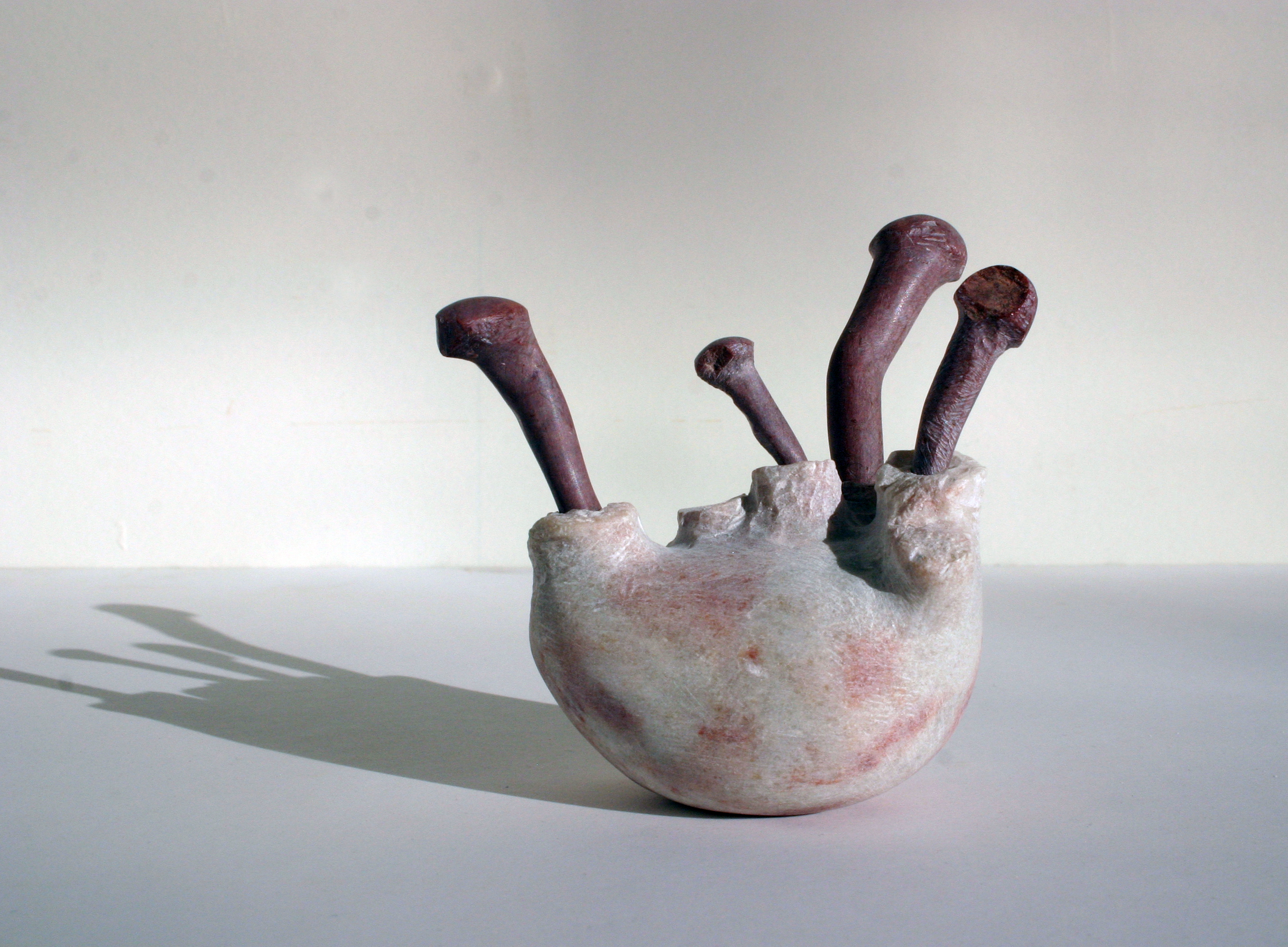I started my love affair with stone a little over ten years ago with Danby marble from Vermont. I was enamored by the sharpness of it, the predictability of how it breaks, the way it yields and responds to a chisel. Having tried many other types of stone, I keep coming back to marble. Marble is so lush and magical the way it sparkles. Even though marble holds the most allure for me, I would have to admit to feeling the most pure joy when carving limestone with just a hammer and chisel. There are some gorgeous types of limestone out there and, perhaps because it is a more subdued pallet, it can be extremely rewarding to experiment with textures on a limestone surface.
 For me the process of sculpting and carving stone is an influx moment, based on a continuous searching of the materials’ intrinsic qualities and its possibilities for expression. Finding the process itself conducive to further experimentation, I enjoy combining materials and forms that quite often contradict their final aesthetic/functional appearance such as: marble that is carved to appear soft and fabric that is sewn to be rigid and architecturally structured. In order to emphasize this visual reverse play between materials, I also reevaluate the potential of various colors and textures of stone. Pink marble won my devotion early on; the color was exciting, fleshy, playful and worked well with the soft, stacked, pillow-like forms I was creating. I found yellow marble intriguing to work with because its color could be both repulsive and beautiful at the same time. I search for stone that has attractive color but not the show-stopping kind. A solid color is best – something I can work with that doesn’t scream out “Look at me I am a beautiful piece of stone!!” My desire is for people to recognize and enjoy the forms I am creating before understanding or knowing the material it is created from.
For me the process of sculpting and carving stone is an influx moment, based on a continuous searching of the materials’ intrinsic qualities and its possibilities for expression. Finding the process itself conducive to further experimentation, I enjoy combining materials and forms that quite often contradict their final aesthetic/functional appearance such as: marble that is carved to appear soft and fabric that is sewn to be rigid and architecturally structured. In order to emphasize this visual reverse play between materials, I also reevaluate the potential of various colors and textures of stone. Pink marble won my devotion early on; the color was exciting, fleshy, playful and worked well with the soft, stacked, pillow-like forms I was creating. I found yellow marble intriguing to work with because its color could be both repulsive and beautiful at the same time. I search for stone that has attractive color but not the show-stopping kind. A solid color is best – something I can work with that doesn’t scream out “Look at me I am a beautiful piece of stone!!” My desire is for people to recognize and enjoy the forms I am creating before understanding or knowing the material it is created from.I have huge respect for chlorite as a carving stone due to the contrast in color between a finished and unfinished surface. I found it rewarding to go from the greenish-gray to a beautiful polished black surface. Occasionally, I work with alabaster but it tends to be too high-maintenance for my liking. I find myself resenting having to put a pillow under it and treat it gently. And sanding Alabaster is torturous. Although admittedly, I still have lustful feelings toward the orange variety and, since it is now hard to get ahold of, I deem it alone worthy of the tender attentiveness required.
I definitely have a soft spot for pyrophyllite, commonly called Wonderstone. It comes in all kinds of fun colors and (almost) effortlessly takes fine detail. Sanding and polishing are two of my least favorite activities but this type of stone is actually fun to sand! You can clearly see when you need to change grits and are quickly rewarded with brilliant saturated color. Although, I have carved pieces of Wonderstone as large as 180lbs I prefer to work this stone into small sculptures.
I enjoy doing work that is both additive and subtractive, often creating one sculpture from multiple parts of different colors of pyrophyllite.

